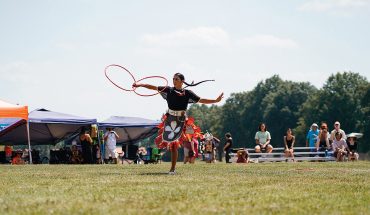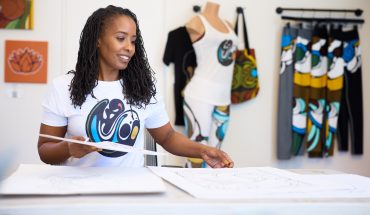by Todd Cohen
Raleigh lawyer Blake Simpson Fricks is the kind of volunteer every nonprofit wishes it had: one so dedicated and effective that the agency is compelled to hire her.
That happened in early 2012, after Fricks had volunteered for five years as a mentor to students for Neighbor to Neighbor, a Southeast Raleigh nonprofit that provides academic programs, job training, and other activities for kids and adults who live in the neighborhood. After her half a decade of service, the agency asked Fricks to consider joining its staff as director of development.
Fricks wanted to help and also wanted to keep her job as an intellectual property lawyer at the Raleigh law firm Smith Anderson. So she got permission to scale back her work at the firm for 18 months to take the job on a part-time basis.
Since then, Fricks has helped raise nearly $900,000 for the agency and prepared it for a capital campaign to raise $400,000. That sum will go toward a new building next to its current quarters at Blount and Bragg streets. As part of that effort, she enlisted her younger brother, PGA golfer Webb Simpson, winner of the 2012 U.S. Open, to host tournaments last year and next spring to benefit the agency.
“In Raleigh, there are so many incredible nonprofits that are doing amazing work,” says Fricks, 33. Neighbor to Neighbor’s programs are meaningful to her because they are “focused on helping people break the cycle of poverty,” she says. “It’s all about bridging them into the mainstream.”
Neighbor to Neighbor hired a full-time development director this fall, and Fricks is practicing law full-time again, although she continues to serve on the nonprofit’s development team.
Her commitment to her city runs as deep as her Raleigh roots. Born at the old Rex Hospital and a graduate of Broughton and UNC-Chapel Hill, Fricks is the daughter of Sam Simpson, co-founder and former co-CEO at York Simpson Underwood (now Berkshire Hathaway Home Services), and Debbie Simpson, a former teacher at Wake Forest Elementary School. She and her husband Wesley Fricks have two sons, ages 1 and 3.
What did you want to be when you grew up?
I never grew up thinking, “I want to be a lawyer.” My parents always thought I would be a good lawyer – part of the character flaw of loving to argue with them.
What is your earliest memory of giving?
We would always select a family to shop for at Christmas and deliver food and toys to the family. I learned just how wonderful it feels to give. Lots of us in situations like that think we’re going to help someone else, and in the end it makes us feel so good and so happy.
What’s behind the name Neighbor to Neighbor?
It has a rich grassroots history. Everything has come up out of the neighborhood. In 1994, moms in the Walnut Terrace housing project in Southeast Raleigh asked for after-school academic programs for their children. Royce Hathcock is the executive director. His passion is urban youth development. He lives in the neighborhood. Where a lot of people see issues, like illegal immigrants or gangs or drug dealers, Royce sees people.
He believes that to change a community, you need to live there. He’s a white guy and lives in a predominantly African-American community. He raised his children there.
What does the agency do?
Our programs are focused on helping people break the cycle of poverty. We have a staff of 11 and more than 300 volunteers, and serve about 1,000 people a year, kids and adults, with about a dozen programs.
We work with kids, starting in first grade, who are testing below grade level in math and language. We provide after-school academic assistance, including a homework lab and college prep. We have a basketball program on Friday nights; a partnership with Wake Tech offering GED classes; job training for men and women; and a student employment program and college scholarship program.
How do nonprofits differ from businesses?
Raising money is much harder than practicing law. It feels like a lot of nonprofits are going after the same grants or foundations. And your competitors are great causes doing great work, which says a lot about Raleigh. I think that’s a great thing.
You helped raise money for Erskine Bowles’s two campaigns for the U.S. Senate. Is fundraising different for nonprofits and politics?
For political fundraising, you’re really after the dollars. In nonprofit fundraising, you’re after the heart. You don’t just want a check; you want them engaged in the cause.
What have you learned from nonprofit work?
The challenges of breaking the cycle of poverty are so complicated. If you are able to help someone find employment, then transportation might be an issue, or child care. It’s just so complicated.
What about nonprofits do you wish you could change?
I wish nonprofits weren’t even needed.
If you could fix a social problem, what would it be?
Housing. Raleigh doesn’t have enough affordable housing.
What do you like about Raleigh?
There’s such an amazing culture of giving. The more I learn about the nonprofit sector, the more I’m amazed about how many people are doing good in our community.
What inspires you?
Books, my family, the good in human nature, food. I’m passionate about food. If I’m not thinking about Neighbor to Neighbor, my children, or work, I’m thinking about food.
What are you reading now?
I am slowly making my way through When Helping Hurts. Some of our most well-intentioned helping or giving can actually hurt. The book focuses on helping people gain dignity and stability on their own through programs that empower them and give them skills to survive on their own.
Who are your heroes?
I’m constantly inspired by my younger brother, Webb. I always have looked up to the way he lives life.
What do you do for fun?
Going out to eat, cooking. I love ethnic food of any kind. I love to play poker. Texas hold ’em is my game.
What does philanthropy mean to you?
How we can use those things we’ve been gifted with to help other people.
What is your philosophy of life?
I pray every day that my day will bring glory to God. I fail a lot of days, but I do try.





